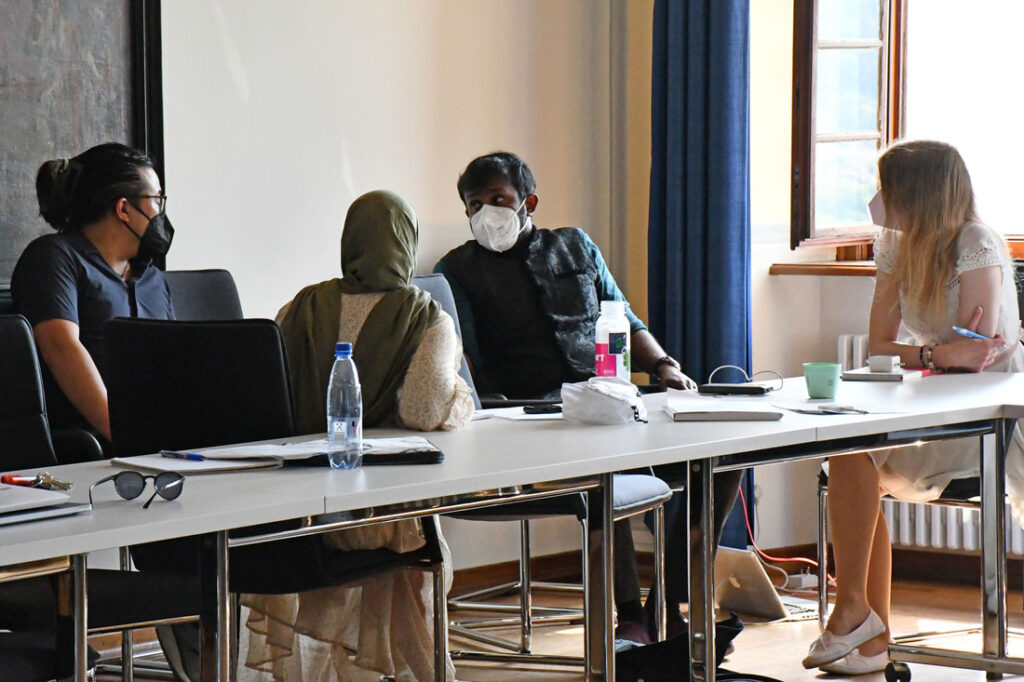UNC-Chapel Hill and Eberhart Karls Universität Tübingen Created a Seed Fund for Joint Research on Emerging Technologies
IIE congratulates the University of North Carolina at Chapel Hill on receipt of the 2024 Andrew Heiskell Award for Innovation in International Education. The University’s Data Science and Society Collaboration with Eberhard Karls Universität Tübingen funds multidisciplinary research that engages U.S. and German faculty and students in the topic of data and society. The innovative approach is designed to generate and support sustained research collaborations that address the challenges of emerging technologies to democratic societies. As a benefit of receiving the Heiskell Awards, IIE is publishing guest entries from each recipient institution.
UNC-Chapel Hill and Eberhart Karls Universität Tübingen have been partners since 1986. How did the new idea of a joint seed fund for research come about?
In January 2022, I joined UNC Global Affairs, and one of my first priorities was to support and strengthen the rich, long-standing partnership between UNC-Chapel Hill and Eberhart Karls Universität Tübingen. At the heart of this relationship is the idea that the two institutions can do more together than alone.
Coinciding with my arrival in 2022, UNC-Chapel Hill established the School of Data Science and Society (SDSS). Unlike data science programs focused mainly on computer science, Carolina’s new school emphasizes the interconnected and complex issues that emerging technologies create for society. Tübingen is a German University of Excellence and leader in machine learning and data science. Researchers at Tübingen work closely with policymakers in Germany and throughout the European Union, and have been at the forefront of protecting data and regulating misinformation.
My team in the global affairs office saw an opportunity here: to expand collaboration through joint projects involving data science. That same year, our universities created a joint seed fund to expand research collaborations over five years and to support multidisciplinary, UNC-Chapel Hill and Tübingen faculty-led projects investigating the use, application, or impact of data science on democratic societies. Our universities contribute equally to funding and jointly reviewing proposals. Together, Tübingen and UNC-Chapel Hill researchers are developing technologies founded in data science and trying to understand their usefulness for society, the risks they involve, and the promise they represent.
Who are the campus champions of the seed fund?
Carolina’s Vice Provost for Global Affairs and Chief Global Officer, Barbara Stephenson, and Tübingen’s Vice-President of International Affairs and Diversity, Monique Scheer, lead our strategic partnership. UNC-Chapel Hill’s dean of SDSS and vice chancellor for research also support the collaboration. Leadership at both institutions saw the potential for advancing research outcomes given complementary strengths – an ideal scenario for productive, mutually-beneficial partnerships.
Did you encounter challenges? How did you navigate through them?
We only received one application in the first cycle of the seed fund. But with sustained outreach to faculty about the opportunity, interest has grown. This past cycle, however, we received eight novel proposals; all eight are currently being funded, focusing on a range of disciplines, including humanities, social sciences, and biomedical fields.
To simplify and expedite fund distribution, we decided to disburse seed funding within faculty members’ home institutions. Collaborators apply for grants jointly, but UNC-Chapel Hill and Tübingen distribute funds to their respective faculty. We removed the challenge that international borders present, but we did not anticipate how difficult it would be to distribute funds across schools at the same institution! We’ve also learned lessons about the timing and cadence of calls for proposals and revised the language to emphasize multidisciplinary approaches.
How has the collaboration grown since its start in 2022?
This innovative collaboration in data science and society has reenergized UNC-Chapel Hill’s partnership with Tübingen and expanded it into many new areas. Today, activity spans a range of schools and departments across campus, including language studies, communication and media, digital humanities, exercise and sports science, information and library science, law, linguistics, humanities and philosophy, health sciences, and physical and natural sciences. Discussions have continued around joint research and student engagement in epidemiology, environmental sciences and engineering, geosciences, infectious diseases, microbiology and immunology, nutrition, oncology, pharmacy and pharmacology, and psychology. As of December 2023, 153 coauthored publications have been published in the last five years (Source: SCOPUS).
Please share key takeaways from establishing the seed fund.
Other partnering institutions can use the UNC-Chapel Hill-Tübingen experience as a model to foster engagement on a specific global challenge or to expand a partnership. In the beginning, we utilized Zoom for faculty from both institutions to meet in virtual break-out rooms to dive into content and begin matchmaking. Reciprocal delegation visits with university leadership and faculty have invigorated the relationship.
Achieving a balance between top-down and bottom-up support has been key. UNC Global Affairs leadership and the partnerships team spot opportunities — scanning the landscape for promising global collaborations and funding which present low risk and high reward. However, it is the faculty-led initiatives that generate the exchange of ideas, ground-breaking research, and solutions to shared challenges.
The Heiskell Award was created in 2001 to promote and honor outstanding international higher education initiatives conducted by IIENetwork members. By recognizing excellence and innovation, IIE supports IIENetwork members in their endeavors, encourages the expansion and creation of initiatives based on these successful models, and amplifies the important role of international higher education on campuses and communities. Each winning initiative receives $1,000 to contribute to their ongoing success. Learn more about the awards and honorees at iie.org/HeiskellAwards.
